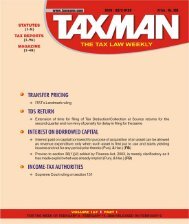CPT V24P7-Art1 (Content).pmd - Taxmann
CPT V24P7-Art1 (Content).pmd - Taxmann
CPT V24P7-Art1 (Content).pmd - Taxmann
You also want an ePaper? Increase the reach of your titles
YUMPU automatically turns print PDFs into web optimized ePapers that Google loves.
Direct Tax Laws<br />
Whether banks have to maintain identity of<br />
the bad debts written off in case of rural branches<br />
and other branches and adjust the write off<br />
relating to rural advances in the provision<br />
account maintained as per section 36(1)(viia)<br />
and the write offs relating to non-rural branches<br />
being eligible for deduction separately under<br />
section 36(1)(vii), read with section 36(2)?<br />
DECISION OF THE COURT<br />
5. The Apex Court held that sections 36(1)(vii)<br />
and 36(1)(viia) are separate items of deduction.<br />
They are independent provisions and cannot<br />
be intermingled or read into each other. It is<br />
a well-settled canon of interpretation of fiscal<br />
statutes that they need to be construed strictly<br />
and on their plain reading.<br />
Section 36(viia) was introduced by the Finance<br />
Act, 1979 w.e.f. 1-4-1980 and the scope of the<br />
provision was explained by the CBDT vide its<br />
Circular No. 258, dated 14-6-1979 in which it<br />
was explained that the provisions were<br />
introduced to promote rural banking and assist<br />
the scheduled commercial banks in making<br />
adequate provision out of their current profits<br />
in order to provide for risks in respect of rural<br />
advances.<br />
Clause 13.3 of the Circular states that the<br />
deduction on account of provision for doubtful<br />
debts, is distinct and independent of section<br />
36(1)(vii) relating to allowance of deduction<br />
for bad debts. The scheduled commercial banks<br />
would continue to get the benefit of writing<br />
off of irrecoverable debts as per section 36(1)(vii)<br />
in addition to the benefit of deduction of the<br />
provision for bad and doubtful debts under<br />
section 36(1)(viia).<br />
The Court observed that it is inclined to give<br />
an interpretation which would serve the<br />
legislative object and intent, rather than<br />
subverting the same. It held that the language<br />
of section 36(1)(vii) is unambiguous and does<br />
not provide for dual interpretation. However,<br />
this benefit of bad debts write off is subject<br />
to satisfaction of conditions contained in section<br />
658<br />
August 1 to 15, 2012 u TAXMANN’S CORPORATE PROFESSIONALS TODAY u Vol. 24 u 38<br />
36(2). The proviso to section 36(1)(vii) does<br />
not control the application of the section,<br />
since the proviso could apply only when the<br />
case of the assessee is covered by section<br />
36(1)(viia) (applicable for scheduled banking<br />
companies).<br />
The Apex Court held that in respect of nonrural<br />
advances, section 36(1)(viia) relating to<br />
maintenance of provision will not apply. So,<br />
any debt written off as irrecoverable is deductible<br />
under section 36(1)(vii) and such claim is not<br />
controlled by section 36(1)(viia).<br />
With regard to rural advances, the assessees’,<br />
i.e., banks are obliged to maintain a provision.<br />
Bad debts written off in respect of rural advances<br />
have to be adjusted against the provision<br />
maintained by the assessee. Only where the<br />
bad debts written off exceed the provision<br />
maintained, such excess is deductible and is<br />
covered by the proviso to section 36(1)(vii).<br />
The proviso to section 36(1)(vii) protects the<br />
interests of the Revenue. For rural advances,<br />
which are covered by clause (viia) there would<br />
be no double deduction. The proviso limits<br />
the deduction towards bad debt write off by<br />
allowing the claim only when the write off<br />
relating to rural advances exceeds the provision<br />
maintained.<br />
The Apex Court also observed that the Full<br />
Bench of the Kerala High Court ignored a<br />
significant expression appearing in both the<br />
proviso to section 36(1)(vii) and section 36(2)(v),<br />
i.e., ‘assessee to which clause (viia) of subsection<br />
(1) applies’. Thus, where the claim<br />
does not fall under section 36(1)(viia) (i.e.,<br />
provision for bad and doubtful debts), section<br />
36(1)(vii) will not apply.<br />
Chief Justice of the Apex Court in his separate<br />
concurrent view held that where the bad debt<br />
write off in respect of rural advances exceeds<br />
the provision, such excess alone is deductible<br />
and this situation is taken care of by the proviso<br />
to clause (vii). He observed that the proviso<br />
indicates that it is limited in its application to<br />
bad debts arising out of rural advances of a











![“FORM NO. 3CEB [See rule 10E] Report from an ... - Taxmann](https://img.yumpu.com/45480232/1/190x245/form-no-3ceb-see-rule-10e-report-from-an-taxmann.jpg?quality=85)





